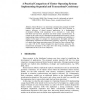Free Online Productivity Tools
i2Speak
i2Symbol
i2OCR
iTex2Img
iWeb2Print
iWeb2Shot
i2Type
iPdf2Split
iPdf2Merge
i2Bopomofo
i2Arabic
i2Style
i2Image
i2PDF
iLatex2Rtf
Sci2ools
129
Voted
ICA3PP
2005
Springer
2005
Springer
A Practical Comparison of Cluster Operating Systems Implementing Sequential and Transactional Consistency
Shared Memory is an interesting communication paradigm for SMP machines and clusters. Weak consistency models have been proposed to improve efficiency of shared memory applications. In a programming environment offering weak consistency it is a necessity to worry about individual load and store operations and about proper synchronization. In contrast to this explicit style of distributed programming hared memory systems implementing strong consistency models are easy to program and consistency is implicit. In this paper we compare two representatives: Kerrighed and Plurix implementing sequential and transactional consistency respectively. Kerrighed is a single system image operating system (OS) based on Linux whereas Plurix is a native OS for PC clusters designed for shared memory operation. The measurements presented in this paper show that strong consistency models implemented at the OS level are competitive.
Related Content
| Added | 29 Jun 2010 |
| Updated | 29 Jun 2010 |
| Type | Conference |
| Year | 2005 |
| Where | ICA3PP |
| Authors | Stefan Frenz, Renaud Lottiaux, Michael Schöttner, Christine Morin, Ralph Göckelmann, Peter Schulthess |
Comments (0)

